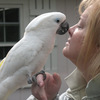As a footnote to my previous post, Patriotic Teaching Moments, Part 1, and in honor of the 200th anniversary of Francis Scott Key's penning of The Star Spangled Banner, I thought I'd give a bit of the history of our National Anthem and provide the "lost verses" ... as information and for reflection.
Francis Scott Key actually penned the poem that would become our National Anthem on September 13, 1814. It was the War of 1812 and Key, who was a Georgetown lawyer was on a British ship anchored outside of Baltimore Harbor, attempting to negotiate the release of a physician friend of his, a Dr. William Beanes. The battle for the American Fort McHenry was underway and the two men were not allowed to leave the ship until the battle was over. Thus it was that Key witnessed the American Flag still waving proudly over Fort Henry at dawn after a full day's bombing campaign by the British and put pen to paper to memorialize what he had witnessed from an eight-mile distance across water.
The poem was originally entitled: The Defence of Fort McHenry. The lyrics of his poem spread via a format known as "Broadside Ballad" (essentially the same way word of The Declaration of Independence had spread through the American colonies decades earlier). The poem was printed on a large format broadside (as well as in newspapers) and distributed far and wide. It caught on ... viral marketing a la 1814. The lyrics were first set against the tune of a British drinking tune: Anacreon in Heaven. That might be stretching the truth of the origins of the tune ... but the composer, John Stafford Smith, belonged to a society of amateur musicians who were known for raising their cups to the music they created.
The music stuck. It stuck across many decades, even amidst criticism that the song was too hard to sing and that the music, having its origins in a drinking society (this from early 20th Century prohibitionists), was inappropriate. Ultimately, composer John Phillips Sousa would settle the debate, stating in 1931: "besides its soul-stirring words ... it is the spirit of the music that inspires". President Woodrow Wilson, during his Administration, had already signed an Executive Order stating that The Star Spangled Banner (as the poem had become widely and affectionately known) should be sung on occasions and at events of national importance where the playing and singing of a National Anthem was warranted. As was mentioned in the previous post, on March 3, 1931, it would become official: US Congress declared The Star Spangled Banner the National Anthem of the United States of America and President Herbert Hoover signed the Act making it so.
The actual Star Spangled Banner that Francis Scott Key witnessed flying over Fort McHenry in 1814 is today housed at the Smithsonian Institute's Museum of American History. Visiting it in person is a profound experience and one that is highly recommended.
Francis Scott Key was a thoughtful, effective, and patriotic poet as well as a successful lawyer. His complete poem follows below. How many of us have ever seen these verses let alone hear them sung? Two hundred years later - almost to the day - those words and the sentiments they express are still very much worthy of our (as Americans) reflection and pride.
"Oh, say can you see by the dawn's early light
What so proudly we hailed at the twilight's last gleaming?
Whose broad stripes and bright stars thru the perilous fight,
O'er the ramparts we watched were so gallantly streaming?
And the rocket's red glare, the bombs bursting in air,
Gave proof through the night that our flag was still there.
Oh, say does that star-spangled banner yet wave
O'er the land of the free and the home of the brave?
On the shore, dimly seen through the mists of the deep,
Where the foe's haughty host in dread silence reposes,
What is that which the breeze, o'er the towering steep,
As it fitfully blows, half conceals, half discloses?
Now it catches the gleam of the morning's first beam,
In full glory reflected now shines in the stream:
'Tis the star-spangled banner! Oh long may it wave
O'er the land of the free and the home of the brave!
And where is that band who so vauntingly swore
That the havoc of war and the battle's confusion,
A home and a country should leave us no more!
Their blood has washed out their foul footsteps' pollution.
No refuge could save the hireling and slave
From the terror of flight, or the gloom of the grave:
And the star-spangled banner in triumph doth wave
O'er the land of the free and the home of the brave!
Oh! thus be it ever, when freemen shall stand
Between their loved home and the war's desolation!
Blest with victory and peace, may the heav'n rescued land
Praise the Power that hath made and preserved us a nation.
Then conquer we must, when our cause it is just,
And this be our motto: "In God is our trust."
And the star-spangled banner in triumph shall wave
O'er the land of the free and the home of the brave!"




Comments:
There are no comments on this post yet. Start the conversation!